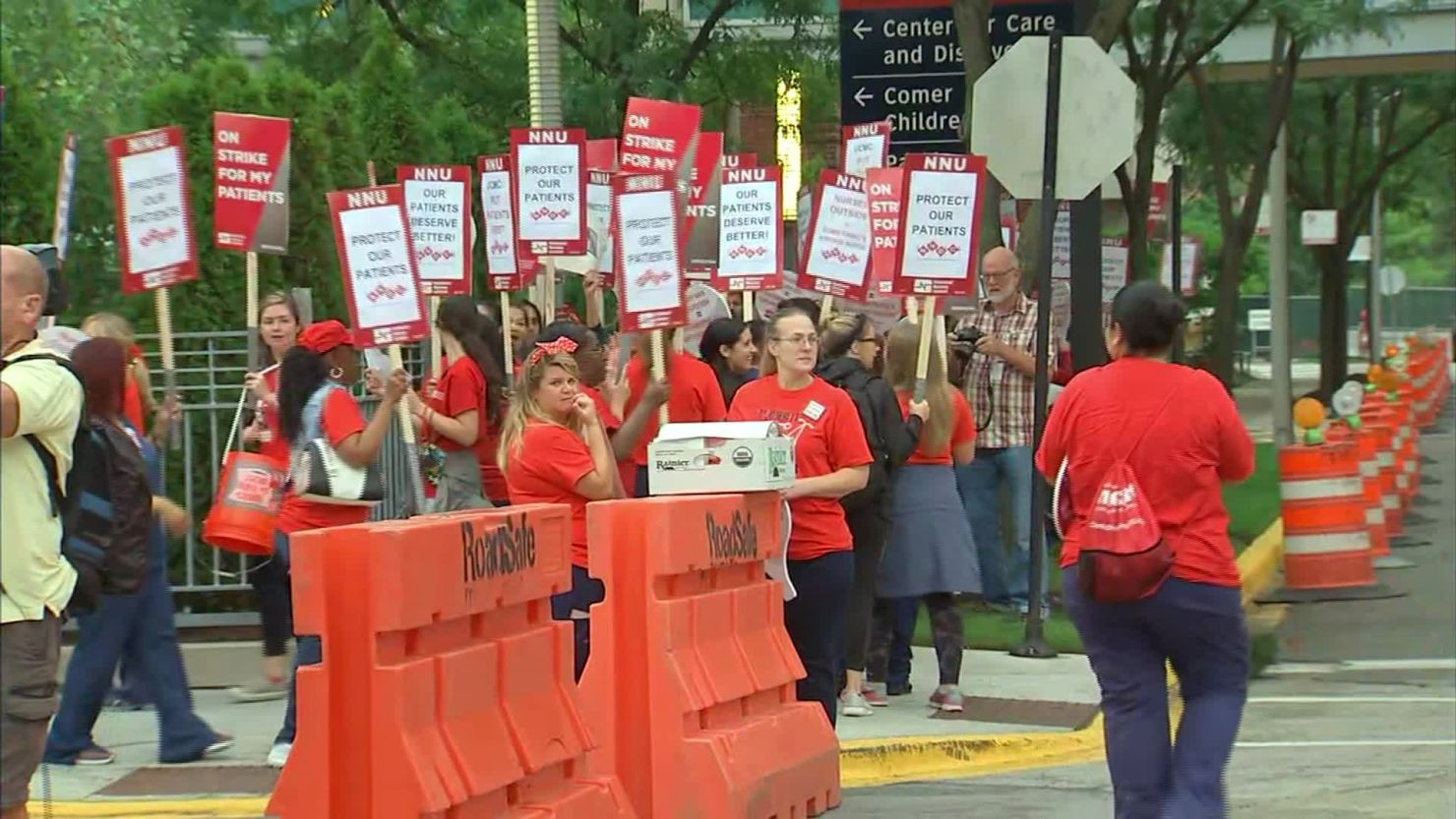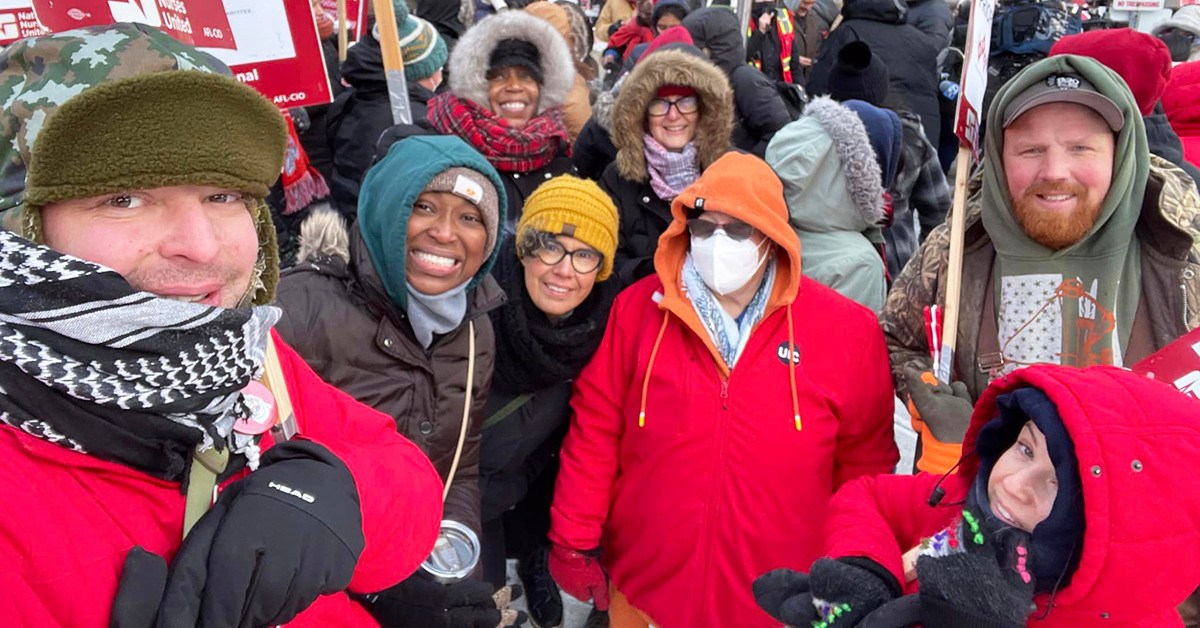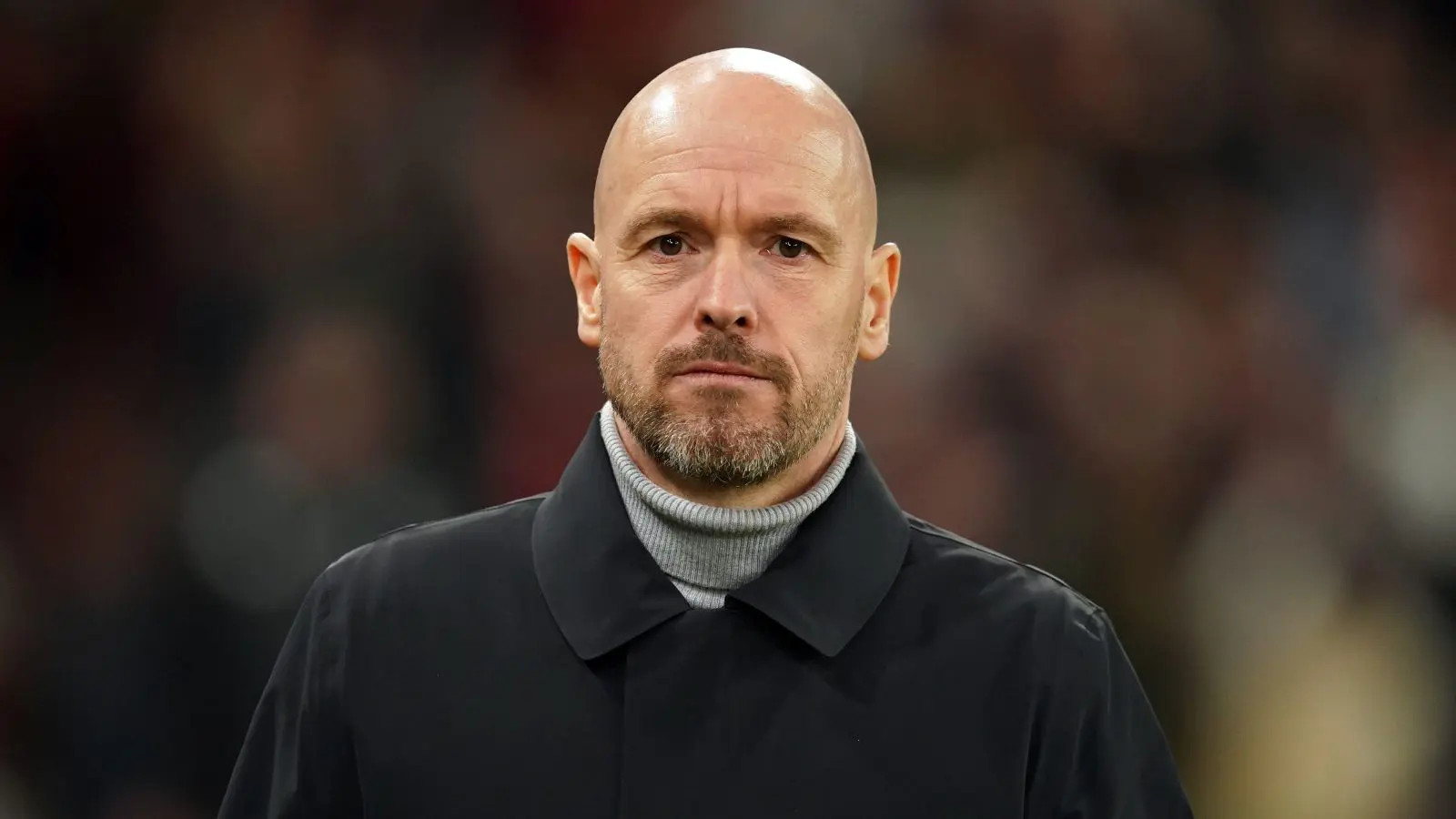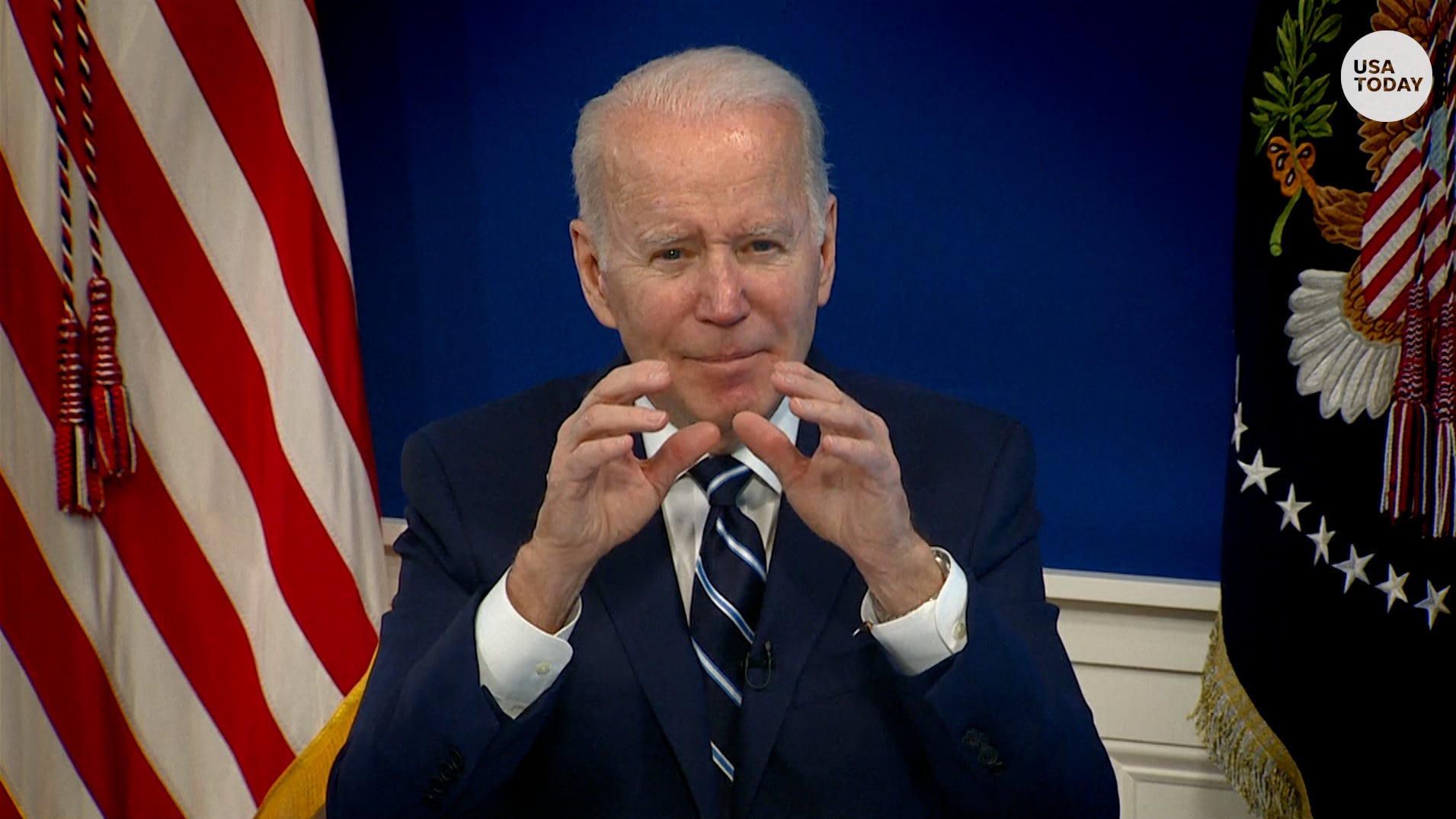Dozens of nurses at UI Health picketed in front of the Near West Side Hospital. About 1,000 nurses went on strike Monday over safety, staffing and better pay as the Democratic National Convention kicked off blocks away at the United Center. The strike, which began Monday, August 19, 2024, is a direct result of a prolonged contract negotiation that union representatives say management has not taken seriously.
The nurses say they’ve been assaulted by patients for years: shoved — one while she was pregnant — and lunged at by a patient’s relative, and otherwise at risk of getting hurt. “One of the reasons we’re striking is the security here is awful,” Emma Stone, a nurse in the intensive care unit at the Near West Side hospital, said Monday in a field with dozens of other unionized nurses, as their colleagues picketed around the hospital across the street. “It’s very scary as a nurse to think like I could get shot or stabbed.”
Stone is among more than 1,000 nurses at UI Health who went on strike Monday over safety, staffing and better pay, as the Democratic National Convention kicked off blocks away at the United Center. UI Health is one of the busiest hospitals in the city and likely would be one of the main hospitals where people would seek medical care should they get sick or injured at the convention. Now the hospital is staffed with temporary nurses.
“We’re glad (the strike is) happening during the DNC,” Stone said. “We hope it brings us more attention. … If anything happens there’s tons of other hospitals that are not on strike. I don’t think it’s a public safety issue for us to be on strike.”
The nurses are also demanding better pay, putting them in line with what nurses at other big hospitals in Chicago make. The unionized nurses also want a cap on how many patients they’re assigned to take care of depending on how sick they are. “I don’t think their reasoning is anything other than money,” Stone said of hospital management. “They don’t realize that your little grandma in the ICU, she’s not being attended to. Nobody is being able to help her if we’re stretched too thin and in other patient rooms.”
Despite the frustrations, Leander Londres, a pediatric nurse at UI Health for 21 years, said he stays for his patients. “My patients come from all over the U.S. and sometimes the world just to seek our care out,” said Londres, who arrived at the strike around 6 A.M. clad in the union’s colors, white and blue. “I wouldn’t go work anywhere else, especially with the benefits that the union has fought for.”
Violence against nurses is a national issue. National Nurses United, which represents nurses across the country, surveyed nearly 1,000 nurses last year. They found that 8 out of 10 nurses experienced at least one type of violence at work. Almost half reported an uptick in violence on their unit.
Leander Londres said there’s not enough security from the emergency department to the psychiatric unit. In the last year he said several co-workers in the ER were kicked in the back and tore muscles, then were out of work for a year.
Simone Ithier is a nurse who helps prep patients and takes care of them when they recover from procedures. She said she left working in the ER after being violently shoved by a patient into a desk when Ithier was heavily pregnant. This happened several years ago. “I used to love (the) emergency room, but when I realized that my safety was at risk and that of my own born child at the time, it wasn’t a place I wanted to be anymore,” Ithier said.
She said she feels safer in her current role, but now staffing is an issue. Sometimes there aren’t enough nurses, Ithier said. Those on the clock have to work through lunch or stay late, Ithier said.
A Cook County judge last week ruled that some critical care nurses will be required to work, such as those who treat patients in the intensive care or labor and delivery units. But the majority of nurses at the hospital and clinics could be on strike for up to a week, unless they come to an agreement with UI Health administrators, said Sarah Hurd, an organizer with the Illinois Nurses Association, the union representing the nurses.
The nurses say they've identified priority proposals around safety for nurses and patients, wages that compete with nearby hospitals, and staffing ratios that allow for high quality care conditions.
“The University of Illinois Hospital & Clinics, the only state hospital in Illinois, is committed to providing high-quality clinical care to Illinois residents,” UI Health said in the recent statement. “Should a work stoppage occur, we are prepared to continue safe patient care and ongoing operations.”
UI Health is a vast system that includes the hospital and dozens of outpatient clinics, and mostly treats Black and Latino patients. More than 40% of patients are low-income, state public health data shows.
In a surprising turn of events, UI Health leadership, who had previously announced that they would not negotiate with the union until after their strike, has agreed to meet for bargaining today. This follows two days of hundreds of union nurses picketing and occupying space across from UI Health hospital. Management of the health provider has agreed to meet with union nurses for negotiations. The two parties will bargain throughout the day with their first joint session at 11am.
Meanwhile across the street, nurses will continue picketing in protest of Unfair Labor Practices committed by the hospital. One of the charges has been regressive and surface bargaining by UI Health and union members are hopeful that this issue is being taken seriously.
“We are committed to making this a fruitful negotiating session,” INA-UIH Chief Steward Kristen Perez said. “We have been making our priorities of safety improvements, staffing ratios and a fair raise loud and clear and are ready to make a deal.”
If a deal is not reached, nurses will continue striking through Sunday, August 25th at 5pm. They will be marking the end of their strike with a rally featuring union members and political leaders starting at 3pm.
The strike has attracted attention from the national media, including The Real News Network, which has been covering the strike from the picket line. The Real News Network interviewed several nurses about their experiences with workplace violence, staffing shortages, and the lack of support from management. They also asked the nurses what message they would like to send to the delegates at the Democratic National Convention.
One nurse said that the Democrats love saying that they’re pro-union, but they need to actually show that they want to actually be pro-union and support every union that’s out there. Another nurse said that the taxpayers need to be aware that the 1% at the hospital need to be taken out and the 99% of us, as workers, we need to be compensated.
The strike is a reminder of the challenges facing healthcare workers across the country. Nurses are facing increasing demands, declining working conditions, and a lack of respect from their employers. The strike is a powerful statement of solidarity and a demand for change.
The strike has also highlighted the importance of unions in protecting workers' rights. The Illinois Nurses Association has been a powerful advocate for nurses in the state, and the strike is a testament to their commitment to fighting for their members. The nurses are calling on the public to support their strike and to demand that their employers treat them with respect and dignity.
The outcome of the strike remains to be seen, but one thing is clear: nurses are not going to back down until they get the respect and the resources they deserve. They are the heart of the hospital, and they are determined to make sure that their voices are heard.


















